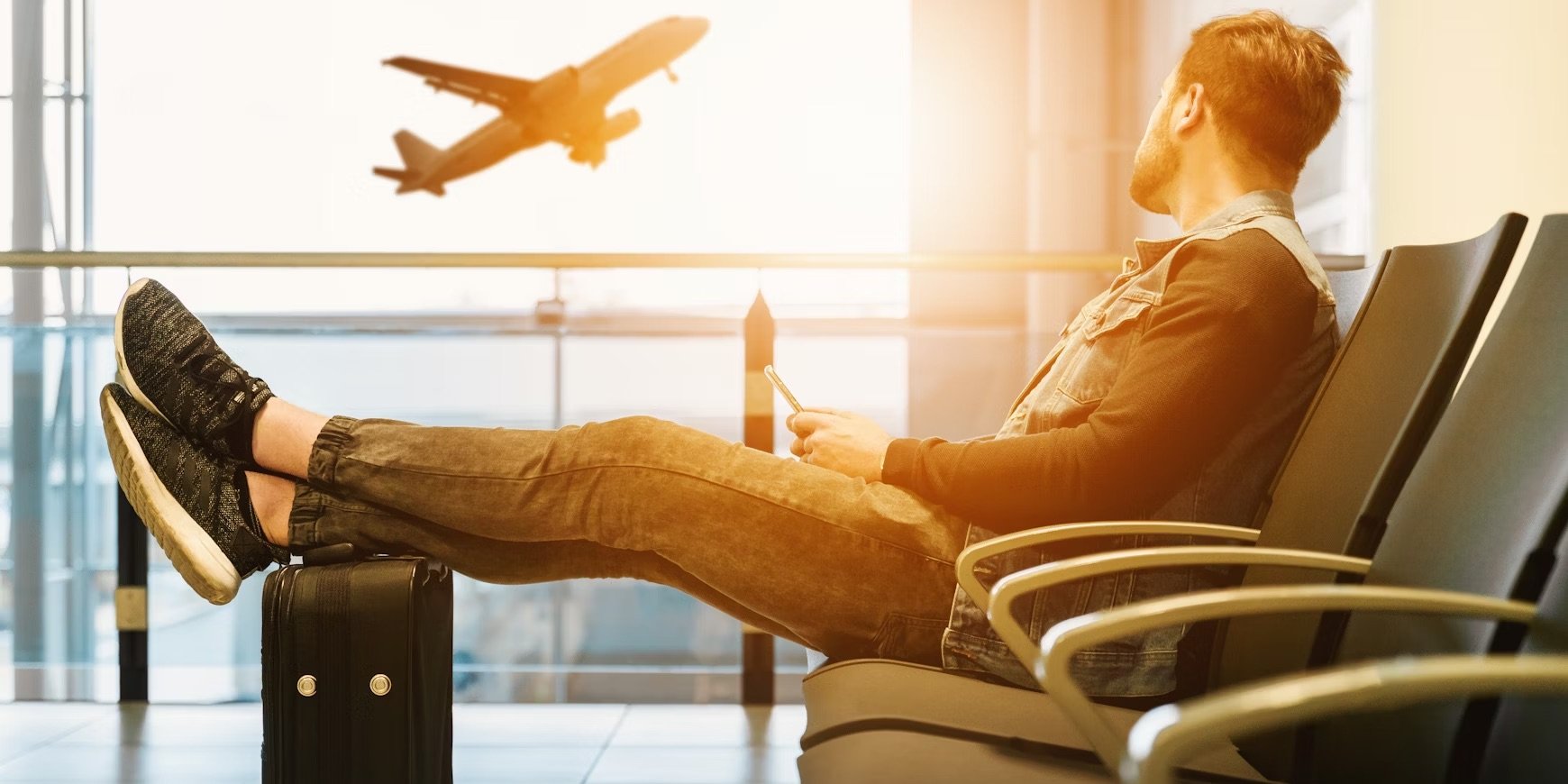Airlines began canceling flights Friday under a federal mandate as the government shutdown stretches into the record books. After tens of thousands of delays and cancellations since the federal shutdown began last month, there's another problem looming for travelers caught up in the chaos.
Many travelers counting on travel insurance – from a standalone policy or a travel credit card with built-in coverage – could soon find that those policies may not cover delays caused by air traffic control shortages or the government shutdown.
The terms of travel insurance can vary wildly from policy to policy, with plenty of gray area. The fine print for coverage on several top travel rewards credit cards suggests extra hotel nights, meals, and expenses from a shutdown-related delay won't be covered. On others, it's up in the air.
Travelers should still collect receipts and file claims to get reimbursed for their disruptions. But they should also be prepared for a fight (and a lengthy review process) to see what, if anything, they'll get.
A Costly Coverage Gap
Millions of travelers have paid the price of traveling during the government shutdown already.
More than 7,200 flights were delayed on Thursday, FlightAware data shows, adding to the tens of thousands of disruptions over the course of the last month since the shutdown began. By midday Friday, nearly 900 flights had been canceled with another 3,200 and counting delayed. And while the government-mandated reductions are meant to keep things moving smoother, the DOT has warned that additional ground stops and delays could ripple through the system throughout the weekend – especially at major hubs like Boston (BOS), New YorkCity -LaGuardia (LGA), Newark (EWR), San Francisco (SFO), and New York City (JFK) as staffing shortages persist.
These are “uncontrollable” delays, which means you can't expect airlines to foot the bill for an extra meal or hotel stay. That's where travel insurance could come in … but maybe not.
When a longtime Thrifty Traveler reader’s United flight from Minneapolis-St. Paul (MSP) to Munich (MUC) (with a connection in Denver) was delayed due to an “air traffic control ground delay program,” he thought his Chase Sapphire Preferred® Card‘s trip delay coverage would help cover an unexpected overnight hotel stay in Denver. Instead, his claim was denied.
The insurer, Virginia Surety (which administers Chase’s travel protections), ruled the delay ineligible because air traffic control issues aren’t considered a covered hazard. According to the terms provided by Chase regarding trip delay protection, the benefit only applies to delays caused by equipment failure, inclement weather, labor strikes, or hijacking/skyjacking.
That one example points to a much bigger problem as the shutdown drags on: at least by the way their terms are written, most credit card travel insurance may not cover government- or FAA-related delays.
Our team reviewed the trip delay and cancellation coverage on several top travel rewards credit cards, including the Chase Sapphire Preferred, Chase Sapphire Reserve®, Capital One Venture X Rewards Credit Card, and the American Express Platinum Card® – and found that all include generous trip delay protection … but only for very specific causes.
In each case, there’s no explicit mention of air traffic control ground stops, FAA staffing shortages, or government shutdowns. That means travelers whose flights are delayed or canceled due to air traffic control issues could ultimately be responsible for their own meals, hotels, or transportation costs – even if they paid with a premium travel card that usually covers such expenses.
Thrifty Traveler reached out to Chase, American Express, and Capital One on Thursday evening for clarification on whether FAA-ordered cancellations or shutdown-related delays qualify for reimbursement. As of publication, only American Express has responded.
Late Friday, American Express provided clarification, confirming that its embedded card benefits – including Trip Cancellation and Interruption Insurance and Trip Delay Insurance – will not cover flight cancellations or delays caused by the FAA’s emergency order or the ongoing government shutdown. However, Amex noted that travelers who separately purchased a standalone American Express Travel Insurance policy may have coverage under certain circumstances through its Global Trip Delay or Trip Interruption plans.
Amex also pointed to its optional Trip Cancel Guard, which can provide reimbursement when an airline credit or voucher is not offered, forfeited, or expired. In all cases, Amex advised cardmembers to work with their airline first and to contact Amex’s claims line at 1-800-228-6855 to determine eligibility.
The world of travel insurance is filled with gray areas and legalese. You can get one answer one day and another answer the next. There's wiggle room for insurers to approve (or deny) any claim you might submit.
So all travelers should be prepared for a fight. Claim reviewers typically rely on strict definitions in the benefits guide, and any ambiguity – like whether an air traffic control staffing shortage counts as a “labor strike” or “equipment issue” – often results in a denial unless the cardholder presses their case. Documentation and persistence will be key.
Refunds Are Still Guaranteed
Even if your travel card doesn’t cover shutdown-related disruptions, travelers still have one guaranteed protection: federal refund rights.
If your flight is canceled or significantly delayed, you can cancel the trip and receive a full refund – not just a travel credit – regardless of the cause. That includes delays or cancellations stemming from air traffic control issues or the shutdown itself.
That right only applies if you decide not to take the flight. If you’re already en route and stranded at a connection, your options are far more limited.
Read More: Airlines Must Now Give Automatic Refunds for Flight Delays, Cancellations
What Travelers Can (& Should) Do
There’s no easy fix for travelers caught up in this mess. If your flight is delayed or canceled, your credit card’s trip delay coverage may not apply … and many standalone travel insurance policies may not, either – unless you purchased that policy well in advance of the current situation, since the shutdown is now considered a “known event.”
Still, there are smart steps you can take to protect yourself and hopefully limit the chaos:
- Act early. Airlines are adjusting their schedules in real-time to meet the FAA’s 10% reduction requirement. Check your reservations frequently and sign up for flight alerts through your airline or an app like Flighty or FlightAware.
- Look for flexible rebooking options. Many airlines are issuing waivers that allow passengers to rebook their flights by several days without incurring change fees or fare differences, regardless of the fare class booked.
- Know your rights. If your flight is canceled or significantly delayed, you can always cancel your trip for a full refund instead of accepting a travel credit.
- Be patient and kind. Gate agents and phone staff are dealing with the same uncertainty as travelers, and they’re far more likely to help if you stay calm and courteous.
Read More: Flying Soon? What to Do to Prepare for Thousands of Cancellations
Bottom Line
As the shutdown drags on, travelers are facing growing uncertainty – not just from canceled flights and long airport lines, but from the fine print of their credit card benefits, too. While American Express has confirmed that shutdown-related cancellations are not covered by its embedded card insurance, other banks have yet to clarify their policies.
While many top travel cards offer trip delay or interruption coverage, those protections don’t appear to apply when delays stem from air traffic control shortages or a government shutdown. And even if issuers eventually interpret those events as covered, travelers should expect a long, uphill battle to get reimbursed.








The lengthy, uphill battle is not new, even for covered expenses. I have filed two claims with Virginia Surety. One for trip cancellation due to illness, the other for a cracked windshield on a rental car. It took a full year to get reimbursed for the illness cancellation, and two to three months for the windshield. I believe they make it hard on purpose, hoping people will just give up.
The shutdown adds a wrinkle though. My takeaway is avoid optional travel and cancel before getting on the plane if it appears your trip will be delayed.